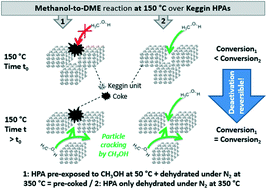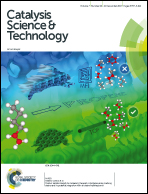Keggin H3PW12O40 pore blockage by coke can be reversible in the gas phase methanol-to-DME reaction†
Abstract
The gas phase dehydration of methanol to dimethylether (DME) nowadays attracts more and more interest as DME is one of the most promising renewable fuels for the future. As catalysts, many studies now use heteropolyacids (HPAs) which have an exceptionally high Brønsted acidity. In the present work, H3PW12O40 (the most widely used Keggin-type HPA) was intentionally coked (covered with carbonaceous deposits) by involving methanol in its dehydration pre-treatment at 350 °C. Then, it was compared to a non-coked reference sample in terms of specific surface area, acidity and catalytic performance in the methanol-to-DME reaction at 150 °C, namely, a temperature at which no significant coking occurs. The results show that, in spite of its significantly lower specific surface area due to pore blockage by coke, pre-coked H3PW12O40 is less active in the methanol reaction only during the first three hours. Afterwards, it succeeds in reaching the same conversion as the reference sample, and its performance is stable. Indeed, flowing methanol induces cracking of the secondary particles of H3PW12O40 (revealed through SEM), and this is proposed here to progressively reverse the initially unfavorable pore blockage by coke. So, the present paper shows that coke is not the only factor controlling how the performance of an HPA in the methanol reaction evolves with time-on-stream. Particle cracking due to the reaction flow also plays a role and, in certain conditions, its positive impact wins against the negative impact of coke. Thus, more generally, when performing the methanol reaction itself at 300–350 °C (i.e. conditions under which coking occurs), with the aim of keeping a high catalytic performance as long as possible, one should try to play on both factors instead of only on the production of coke.



 Please wait while we load your content...
Please wait while we load your content...